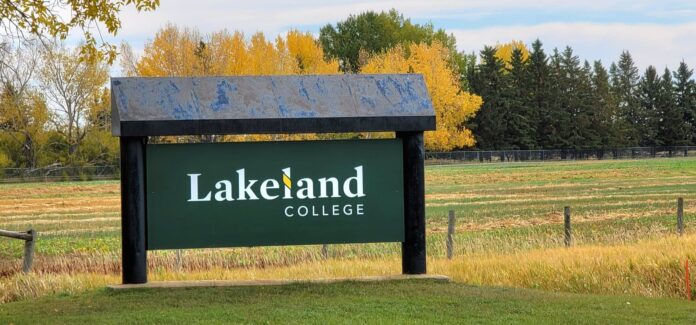Lakeland College has ranked 33rd on Canada’s Top 50 Research Colleges list in 2022 by Research InfoSource.
Lakeland sits in second place in the annual survey for college research income growth with research income growing by 251.8 per cent in 2020-21.
During that fiscal year, Lakeland secured $3.05 million in total sponsored research income, collaborating with a range of government, industry and post-secondary partners.
“We’re excited to share the results of this national survey with our team and many partners. It reflects the incredible progress Lakeland’s applied research department has made in growing our team, our capacity for projects and overall investment in research that’s relevant to both producers and industry,” says Dr. Todd Sumner, Lakeland’s vice president of academic and research.
A key research project Lakeland spearheaded in 2020-21 was the calibration of in-bin drying.
Lakeland’s applied research team reported the following in 2020-21:
• 1,803 hours of faculty engagement in research
• 14 faculty involved in research
• 42 non-faculty staff supporting research
• Four researchers
• 16 technicians
• 122 unpaid students exposed/participating in research projects
• 33 paid students participating in research projects
• 998 cumulative number of students to date involved in applied research activities
• 21 active projects
• 15 unique research partnerships with industry/organizations
“At Lakeland, enhancing the agriculture industry’s productivity, profitability and competitiveness is our tactical focus. With each project, we work to support student-learning outcomes as well as enhance social, environmental and economic outcomes for our province,” says Dr. François Paradis, director of Lakeland’s applied research department. “We look forward to sharing the results of current projects underway to advance this vital industry.”
Some current ongoing projects include:
- Maximizing feed barley yield while minimizing lodging
- Investigating the agronomics of lupin production, a new high protein pulse crop for Alberta
- Reducing beef production costs through swath grazing complex forage mixtures during winter in Alberta
- Health impacts of feeding garlic products to growing cattle
- Development of a neonatal mineral and vitamin supplement to improve health in livestock
- Optimization of non-contact sensing technologies to enhance sustainability of bison farming
- Precision Ranching: Remote assessment of bull activity under range conditions to improve pregnancy rate
- Smart handheld device for automatic blood analysis: Innovative prediction of sheep pregnancy and litter size
- Automating replacement heifer selection – demonstration site.




